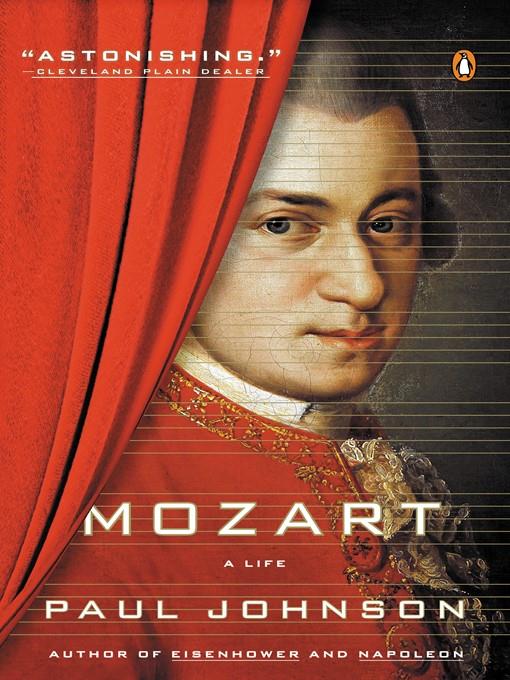
Mozart
A Life
کتاب های مرتبط
- اطلاعات
- نقد و بررسی
- دیدگاه کاربران
نقد و بررسی

September 30, 2013
Historian Johnson (A History of the American People) has taken to writing succinct biographies of world-renowned figures like Darwin and Churchill that usually clock in under 200 pages, and this newest work, is no exception. Johnson packs a great deal of information into these pages in this chronological narrative, and his grasp of Mozart’s musical output is astounding, his descriptions of Mozart’s works comprehensive and enlightening. Johnson nicely gets into Mozart’s character (“Mozart had just enough experience with opera for it to remain fun, without disgusting him”), and he challenges preconceived notions about Mozart’s financial situation, marriage and, in an epilogue, the events surrounding his death. Overall, this is a solid, and often fresh, introduction to the life and work of the composer.

September 15, 2013
An impassioned mash note to an immeasurable artist. In the latest of his short biographies of great men (Darwin: Portrait of a Genius, 2012, etc.), historian Johnson doesn't stint on his love for the singular life of Wolfgang Amadeus Mozart (1756-1791). The facts, of course, remain staggering: Mozart was playing piano at 3, composing at 5, touring and writing piano minuets and violin sonatas by 7, an opera, and a mass and two symphonies by 12; he was knighted as a maestro by 15. He was gifted with a phenomenal memory for everything he heard, a mastery of instruments, a perfect ear for tone and pitch, and a work ethic spurred by ceaseless inspiration. He wrote all the time--during his morning wig fittings, in a coach, in between playing billiards or all through the night. The faucet never shut off, particularly in his last decade, when he was churning out immortal symphonies, operas and concertos at warp speed, bouncing from one form to the other without breaking a sweat. This is a very personal appreciation, and Johnson captures the depth of Mozart's achievement with a scholarly fan's feverish and at times overweening enthusiasm. He barely notices the composer's wife, children or negative attributes, presuming he had any. This Mozart is not only great, but exceptionally good, a kind, warm, deeply religious, financially astute--despite Johnson's own evidence to the contrary--artist who was adored by women, beloved by all, resentful of no one and died at 35: "He seemed to know he was dying, but his mood was composed, tranquil, resigned to accept his fate, and grateful for all the mercies life had brought him." A hard-sell hagiography but also a compact and knowledgeable portrait of genius.
COPYRIGHT(2013) Kirkus Reviews, ALL RIGHTS RESERVED.

Starred review from November 1, 2013
For once taking an uncontroversial stance, politicallycontentious popular historian Johnson lauds everyone's favorite composer so as to pique the interest of every reader of this profile. He seems to have two primary objectives: to explain why Mozart's music is so good and to uproot the sentimental legends that have grown like so much honeysuckle (a weed, after all) around Mozart's life. While proceeding overall in good biographical chronology, Johnson prosecutes his first objective by, for instance, discussing how Mozart's writing for particular instrumentsfrom piano to viola to the then-new clarinet to trombone to tympanireflects mastery of the qualities and capabilities of each (the chapter occupied with this argument is reason enough to rejoice about the book). Johnson starts debunking myths on the first page, where he insists that Mozart wasn't a sickly child. Thereafter, he continues to lay bare misconceptions: that his father coldly exploited him; that he ever lived in poverty; that he was lascivious and unfaithful to his wife, as well as that she was improvident and shrewish; that he had a pauper's burial; that he ever was a neglected musical presence in his time; that he was ruinously in debt. They all crumble under Johnson's commonsense presentation of evidence. An altogether excellent primer on possibly the most complete musician who ever lived.(Reprinted with permission of Booklist, copyright 2013, American Library Association.)

June 15, 2013
Noted historian Johnson's subjects have ranged from Napoleon to Darwin to Jesus, so why not that transcendent musical genius, Mozart? Johnson rethinks aspects of Mozart's life from health to finances but focuses on the magisterial music. Especially nice for generalists.
Copyright 2013 Library Journal, LLC Used with permission.

























دیدگاه کاربران